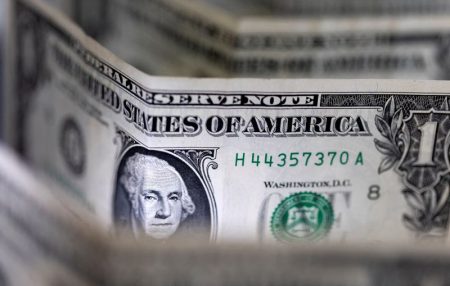Investing.com– Most Asian currencies fell slightly on Tuesday as demand for the dollar remained steady before several major U.S. economic readings this week, while sentiment also remained on edge over the Israel-Hamas war.
U.S. and data is due later in the day, while a string of Federal Reserve members are set to speak this week, most notably on Thursday.
The data and the addresses are set to offer more cues on the world’s largest economy, and will be closely watched after a surprise rise in U.S. inflation over the past three months spurred fears of a more hawkish Fed.
This kept the dollar pinned near 10-month highs, with the and rising slightly in Asian trade on Tuesday.
Uncertainty over the U.S. economy kept most traders wary of risk-heavy Asian currencies. The was flat, while the and the lost 0.3% and 0.1%, respectively.
The was among the worst performers for the day, losing 0.3% after data showed in the third quarter. The reading saw analysts scale back their expectations for more interest rate hikes from the Reserve Bank.
Losses in the were somewhat limited by data showing the island state’s key beat expectations in September.
The rose 0.3% as the minutes of the Reserve Bank of Australia’s recent meeting showed that policymakers were still considering more rate hikes, amid recent stickiness in inflation.
The was flat, hovering just below the 150 level as markets watched for any potential government intervention in currency markets. Focus this week is also on Japanese data, which is expected to factor into the Bank of Japan’s plans to eventually tighten monetary policy.
Most Asian currencies were nursing steep losses over the past two weeks, as the onset of the Israel-Hamas war dented risk appetite. Signs of sticky U.S. inflation also saw markets fear higher-for-longer interest rates, which bode poorly for regional markets.
China GDP, interest rate decision awaited
The fell slightly on Tuesday, remaining near 11-month lows as markets hunkered down before key third-quarter data due on Wednesday.
The reading is expected to show a sustained decline in economic growth, as the country’s manufacturing and service sectors struggle with a slowdown in overseas demand.
A debt crisis in the property market is also expected to have further dented economic growth, although a string of monetary stimulus measures over the past quarter likely helped offset a bigger decline in growth.
The People’s Bank of China is also set to decide on its on Friday, although it is unlikely to make any changes.
Read the full article here















